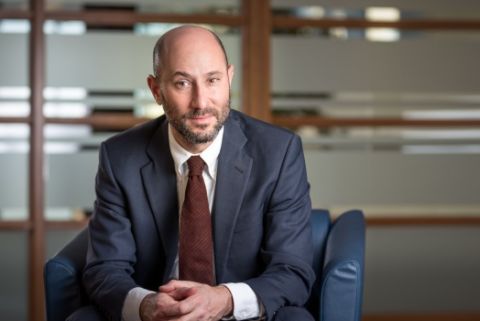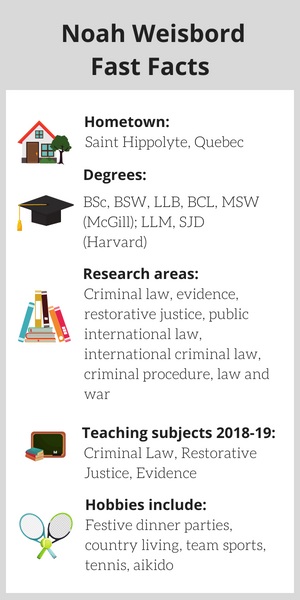
This Q&A is part of a series featuring faculty members joining Queen’s Law this summer. 2018 is a banner year for faculty hires, with the addition of seven new professors to the school’s roster of exceptional scholars. All of these new talented researchers have already earned international recognition in their fields.
Following the start of his new appointment, Professor Noah Weisbord spoke with Queen’s Law Reports to share his professional and personal interests.
How would you describe your past year as a visiting professor at Queen’s Law and why did you decide to join Queen’s Law?
It feels like a jolly homecoming. After years studying and teaching in the U.S., I’m finally home, reunited with family, friends and close colleagues. Plus, it’s an honour to be joining a Canadian law faculty renowned in criminal law.

What got you interested in your area of law?
I became interested in the criminal law when I was a social work student studying the relationship between justice and healing in a class on therapy with involuntary patients. Some people are ordered by criminal courts to undergo therapy and I was curious about how therapists operate in these situations and whether therapy can work.
Tell us about your research.
A unifying theme in my research has been the role of the criminal law in managing, reflecting or exacerbating intergroup conflict. The greater part of my scholarship to date has dealt with criminal law and intergroup relations abroad – the U.S., Rwanda, The Hague – and I am now beginning to bring conceptual and methodological insights I developed to Canadian law, which is contending with intergroup dynamics of its own. A major project has been on the Colten Boushie homicide and the Gerald Stanley case.
What are you most proud of?
Since 2005, I’ve been working with states to enact legislation that will enable domestic, regional and international courts to hold political and military leaders accountable for aggressive war. On July 17, 2018, against all expectations, “the crime of aggression” became a prosecutable international crime alongside genocide, crimes against humanity and war crimes. Instead of collective state responsibility, our leaders are now personally subject to indictment for illegal wars, from invasions and preemptions to drone strikes and cyberattacks. The crime of aggression could be a game-changer in international diplomacy, but it carries great risk along with its promise. My passion project, an insider’s account of the high-stakes fight to define the crime and its jurisdictional conditions, is about to be published with Princeton University Press.
Any hobbies or interests?
Festive dinner parties, country living, team sports, tennis, aikido